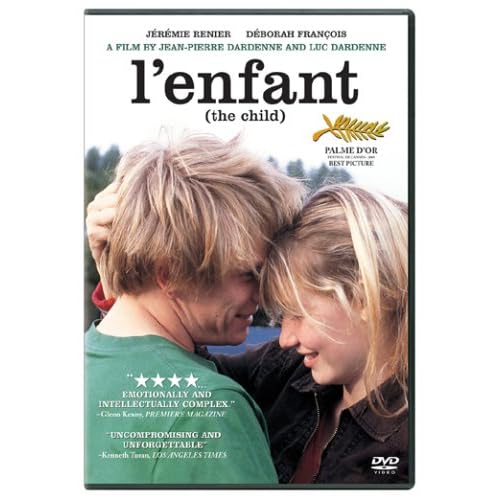
L'Enfant (The Child)
(2006)

 The Dardenne brothers—Jean-Pierre and Luc—cut their teeth on documentaries before being born again as verité narrative filmmakers. Though their films have yet to penetrate American popular culture, the Belgian writer-directors quickly became the darlings of the high-class festival circuit with their no-frills social-realist films La Promesse, Rosetta (winner of the Golden Palm at Cannes), and The Son. Reuniting with Jérémie Renier, the teen star of La Promesse, the Dardennes delivered another Golden Palm winner with L'Enfant (The Child). But does the film live up to the hype?
The Dardenne brothers—Jean-Pierre and Luc—cut their teeth on documentaries before being born again as verité narrative filmmakers. Though their films have yet to penetrate American popular culture, the Belgian writer-directors quickly became the darlings of the high-class festival circuit with their no-frills social-realist films La Promesse, Rosetta (winner of the Golden Palm at Cannes), and The Son. Reuniting with Jérémie Renier, the teen star of La Promesse, the Dardennes delivered another Golden Palm winner with L'Enfant (The Child). But does the film live up to the hype?
Renier plays Bruno, a flash punk more interested in his new jacket than his new child. When Bruno's mate Sonia (Déborah François) returns from the hospital with infant Jimmy in her arms, sub-letters brusquely reject her from her own home. With some effort, Sonia is able to find the father, who's distracted by his latest criminal enterprises. "Only fuckers work," he proclaims. Instead, the young parents live meagerly off the dole and the proceeds from Bruno's fencing of stolen goods.
For the moment, Bruno, Sonia, and Jimmy will have to settle for a transient shelter, though Bruno spends part of his most recent ill-gotten gains on a baby carriage for the child. The other portion goes, impulsively, to buy Sonia a leather jacket to match his own, but it's already apparent that the two aren't playing on the same team. Left alone with his son for the first time, the supremely self-involved Bruno first uses him as a panhandling prop, then decides to sell him—with the swiftness he applies to any other hot merchandise—to a black-market adoption ring.
Obviously, there's more than one child at the heart of the story. In the brief post-partum afterglow, we observe how the parents express affection for one another: schoolyard games (chasing each other around a park) and playful rough-housing (kicking rocks at each other, slapping and biting) that yields to snogging with animal abandon. But the lovers on the run paradigm begins to look Freudian when the screws turn on the couple: Bruno wants maternal love and reliability from Sonia, not for Jimmy but jealously for himself.
That all of this is easy to divine may give the feeling that the Dardennes have rigged their story for maximum audience self-satisfaction (at last, an art-house film we can all "get"!). Furthermore, Bruno has a traditional character arc—a learning curve, if you like—that viewers can moralistically follow to a comforting reassurance of essential humanity. To achieve the effect, the Dardennes must first depict Bruno as a shockingly callous specimen. "We'll have another one," he offers to Sonia, and, in response to the silent treatment, "What did I do?"
In concert with Renier, however, the Dardennes take care to lay the groundwork for Bruno's redemption. The father is not unaffected by the lonely waiting periods he spends with the son he's about to sell. Since Bruno pathologically lies to avoid responsibility, his public projection of blithe detachment can be read as one more self-defensive put-on, a method for putting one foot in front of the other in a lousy existence. Either way, his extremity allows for a more striking eventual epiphany.
L'Enfant offers plain-good storytelling: rigorous acting, handheld urgency, and editing prowess render the whiff of manipulation moot. The Dardennes wisely fashion their fable into a contained time-span: a couple of days that define the boundaries of an emotional pressure-cooker. In a gesture that earns the widespread comparisons to Dostoyevsky and Bresson, the filmmakers hinge the film on an action-oriented anagnorisis, a climactic crime sequence both novel and striking enough convincingly to thrust Bruno out of his moral childhood and into the role of a man who can no longer avoid responsibility and still live with himself.
 |
|
 |
Hot on the heels of its 2006 theatrical release, L'Enfant comes home courtesy of Sony Pictures Home Entertainment. The film looks and sounds great in a clean, film-like transfer—with optional yellow, player-generated subtitles—and 5.1 Dolby Digital Surround soundtrack.
Sony includes a single but satisfying bonus feature: an "Interview with Directors Jean-Pierre Dardenne and Luc Dardenne" (29:52). Shot on video, the piece is actually a France Inter radio interview, presented in widescreen with subtitles. The auteur duo explains the image that spawned the film, the emotional underpinnings of the characters, and the story's sociopolitical context; they also discuss the "life force" essential to make a bleak story worthwhile for an audience, and the challenges and benefits of working with live babies.
Lastly, Sony includes previews for The House of Sand, Quinceañera, Don't Come Knocking, Art School Confidential, Friends with Money, and Caché. This Cannes Golden Palm winner will be a must for many collectors' foreign-film libraries.
| Review gear: |
Panasonic Viera TC-P55VT30 55" Plasma 1080p 3D HDTV
Oppo BDP-93 Universal Network 3D Blu-ray Disc Player
Denon AVR2112CI Integrated Network A/V Surround Receiver
|
Pioneer SP-BS41-LR Bookshelf Speaker (2)
Pioneer SP-C21 Center Speaker
Pioneer SW-8 Subwoofer
|
|---|



